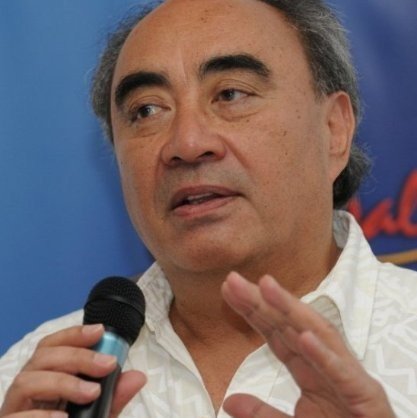ep. 11: Small Island Communities Leading Global Climate Technology Adaptation
In this episode, we speak with Lelei LeLaulu, a preeminent thought leader, diplomat, and pioneer in the realm of United Nations sustainable development policy, island state climate resilience, renewable energy independence, and cultural preservation. Lelei shares his keen understanding of how island and coastal communities can harness the benefits of sustainable tourism, zero carbon ocean-based renewable energy technologies, and debt relief, while leveraging the transformative potential of the incumbent “bad boy” forces of extractive mining and fossil fuel industries.
From his diverse experience, Lelei gives us glimpse into the challenges and opportunities confronted by at-risk island and coastal communities seeking to effectively navigate existential climate-induced threats to their cultural heritage, economy, and way of life; exacerbated by the accelerating loss of landmasses that they have called home for countless generations. Originally from Samoa, he is a highly respected point of reference for government and industry leaders across the broad reach of Pacific, Polynesian, and Caribbean communities, helping them realize what might be the opportunities of “ocean gain” . . . Lelei’s alternative way of looking at the challenges of net global “land loss”.
Lelei Lelaulu
Development Entrepreneur
Lelei LeLaulu is a development entrepreneur working at the confluence of climate change, tourism, food security and renewable energy. Lelei’s career roamed across journalism, diplomacy, international development, sustainable tourism, and consulting governments and corporates on strategic planning. He is president of the Earth Council Alliance, a member of the High Level Group reviewing the 10-year development plan of the Asian Development Bank, and set up the Global Partnership for Oceans of the World Bank. At the International Finance Corporation he advised on sustainable development, and represented the World Bank on the Blue Guardians.
Lelei co-founded the World Tourism Forum in Brazil, the Global Sustainable Tourism Alliance with USAID, the Oceania Sustainable Tourism Alliance, the Caribbean Media Exchange and the Global Ocean Energy Alliance. In addition to the Pacific Leadership Program of the Australian Government, he advised the Pacific Ocean Commissioner and the Secretary-General of the Pacific Islands Forum of government leaders.
For over a decade he was Chairman of the Foundation for the Peoples of the South Pacific the oldest and largest non-profit development network in the Pacific islands, and for another decade he was President/CEO of the development and humanitarian agency, Counterpart International, expanding its operations to the Caribbean, Latin America and Africa.
Lelei was a member of the small team which gave the UN its first major reform, was Secretary of the Task Force to Re-orient UN Public Information Activities, and Chairman for a decade of the Committee for the Security and Independence of the International Civil Service working on the release of hostages and detained people. He was a member of the team that organized the series of summits and global conferences in the 1990s known as the "Development Continuum" which defined the global agenda which led to the Sustainable Development Goals. In addition to working for the Hudson Institute think tank, Lelei served as a correspondent in Africa and the Middle East, and edited the Middle East Newsletter out of New York.
Born in Samoa, Lelei is part of an initiative to re-purpose the tourism sector to be a first responder in post-disaster situations, and is also drafting a universal bill of rights for the Pacific Ocean. He is a director of Gaia, the World Indigenous Games, was an original member of the Symposium series on Religion, Science and the Environment, and serves on several boards including Applied Brilliance, Geographic Planning Collaborative of Abu Dhabi, and the South Eastern European Film Festival.
EPISODE REFERENCES AND LINKS:
Earth Council Alliance; The ECA emphasis is on supporting pragmatic, results-oriented programs worldwide, and matching people, partners, and resources to support local, regional, and national initiatives. ECA will use the Earth Charter and Agenda 21 as historical baselines to measure and celebrate progress.
Alliance of Small Island States (AOSIS) represent the interests of the 39 small island and low-lying coastal developing states in international climate change, sustainable development negotiations and processes.
The Earth Summit ; The United Nations Conference on Environment and Development took place in Rio de Janeiro, Brazil, 3-14 June 1992
Ocean Thermal Energy Conversion (OTEC) makes use of the temperature differential between the warm surface waters of the oceans, heated by solar radiation, and the deeper cold waters to generate power in a conventional heat engine. (Britannica)
International Finance Corporation (IFC) is an international financial institution that offers investment, advisory, and asset-management services to encourage private-sector development in less developed countries.
The Blue Yonder is a responsible tourism model being developed in Kerala, India
The water-energy nexus is the relationship between the water used for energy production, including both electricity and sources of fuel such as oil and natural gas, and the energy consumed to extract, purify, deliver, heat/cool, treat and dispose of water (and wastewater) sometimes referred to as the energy intensity. (Wikipedia)
If you enjoy the Blue Economy Primer podcast, and would like to support Deep Blue Academy’s non-profit education and research work, please consider making a tax deductible donation today.







